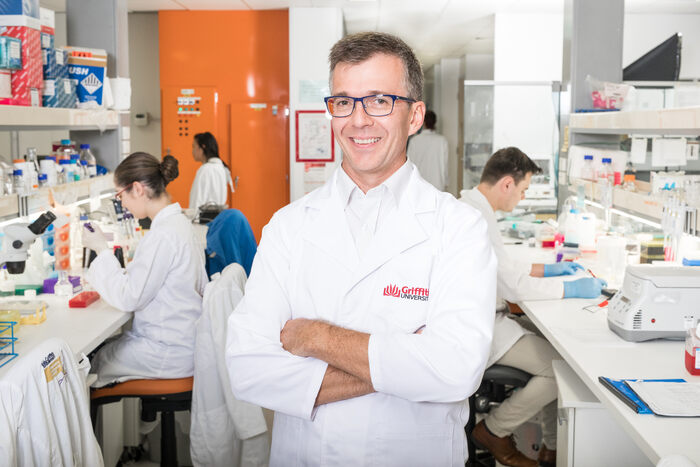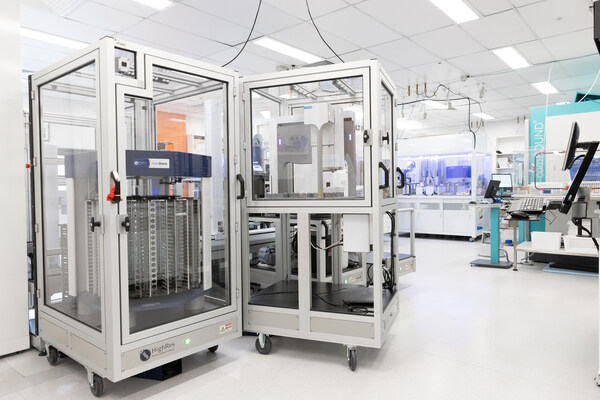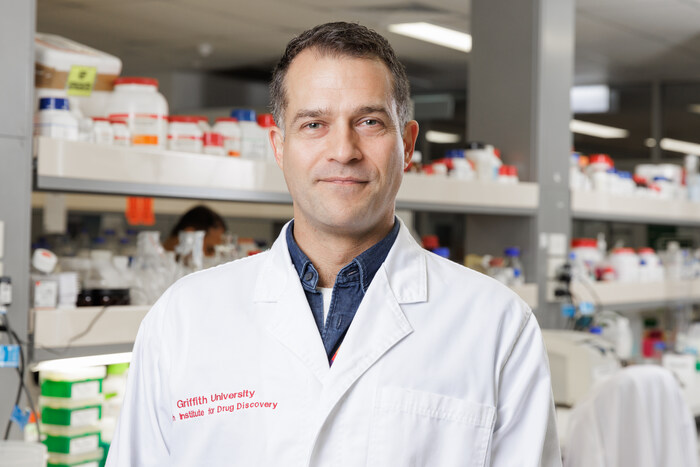Biology is complicated – but viewing biological systems as a whole can lead to positive impacts across the health, agriculture, food and environmental sectors.
Biology is much more complicated than we’re often led to believe in our school science classes. In reality, it covers many diverse systems – everything from our own bodies to the environment as a whole, each of which rely on complex sets of interactions to function. Traditional approaches to biology look at taking apart and studying the components making up these systems. However, this can miss information provided by looking at each system as a whole.
Systems biology is an interdisciplinary field that uses a holistic approach to model and study the complex interactions within biological systems – it puts the components together to see how they work. Associate Professor Horst Schirra and his team at the Griffith Institute for Drug Discovery (GRIDD), Griffith University focus on one pillar of systems biology – metabolomics.
“I transitioned my research direction from structural biology to systems biology because of my desire to work on the “big picture” problems in biology. We use innovative nuclear magnetic resonance (NMR) spectroscopy-based techniques through a specialised NMR facility at GRIDD to study how small molecules known as metabolites interact within biological systems. For example, we look at how biological systems are affected when exposed to disease or environmental change,” said Associate Professor Schirra.
These techniques can help bring together information on complex systems – even when the individual components are well known. For example, the team have been studying the enzyme dihydrolipoamide dehydrogenase, a regulatory enzyme in humans and other animals. This enzyme functions simultaneously across multiple metabolic pathways, and while it is well studied in terms of individual interactions, research is yet to crack how it works across the system as a whole and how it can be manipulated so it doesn’t create unwanted changes. Changes in this enzyme cause insects to be resistant to a major agricultural pesticide used to protect grain stocks, so it is likely to be a useful target in ensuring global food security.
Excitingly, the techniques used by Associate Professor Schirra and his team can be used to find solutions for diverse problems across the health, agriculture, food and environmental sectors. Within health, the team have applied NMR-based metabolomics to better understand the development of obesity and related diseases, to improve the diagnosis of prostate cancer, and to investigate dietary intervention in epilepsy.
Within the food industry, the team have been making strides in enabling impactful economic and social change. For example, they recently delivered a government report to the Australian Federal Department of Agriculture Forestry and Fisheries on the use of NMR to detect counterfeit honey, a huge issue within the honey industry. As honey differs between regions, the team aim to collect metabolite fingerprints of Australian honey from various locations, and to provide small producers with an affordable, accessible and reliable means of certifying their honey products. This will also allow for the marketing of honey products by geographical names as they will be able to be distinguished from each other.
The team are also assisting in the growth of the native food sector in Australia. NMR metabolomics can be used to gain, for example, the nutritional, taste and ripening profiles of fruit from different locations and at different times of year, useful information for the fledgling industry. These profiles can also be used to guarantee the origins and authenticity of a product.
“With collaborators from the University of Queensland, we obtained nutritional and sensory profiles of green plum, red bush apple and wild peach, which are all used by the Yolŋu Aboriginal people of remote East Arnhem Land. We also reported on a framework for the responsible and ethical involvement of Indigenous communities in such research, with this work being aimed at fostering sustainable Indigenous agribusinesses. Metabolic profiling can provide information on the health benefits of the food and be used in product development, marketing and quality control,” said Associate Professor Schirra. “The development of the native food industry in Australia will have other positive impacts, including on food security.”
In collaboration with CSIRO and DSM Nutritional Products, the team have also contributed solutions to the agriculture and the environment sectors through the development of patented feed supplements that limit agricultural methane emissions. These products are now in Phase 3 trials looking at their long-term effects on cattle health and productivity.
Associate Professor Horst Schirra and his team plan to continue to push the boundaries of NMR-based metabolomics by integrating the technique with other methods and by expanding the toolbox of computational methods to analyse metabolomic data. The utility of these techniques across the health, agriculture, food and environmental sectors will see the team deliver a range of positive impacts for a range of stakeholders into the future.
Associate Professor Schirra and his team are open to collaborations with industry and academic groups looking to use NMR-based metabolomics in projects across the health, agriculture, food and environmental sectors.
To learn more about Associate Professor Schirra’s research and his contact details:
If you would like to contribute to GRIDD’s ground-breaking research:
You can also help provide career and personal development opportunities for GRIDD’s students and early career researcher through the GRIDD Director’s Circle.
We are very grateful for any individual or corporate donations and bequests to help us take our research forward.
To keep up to date with developments at GRIDD:
Sustainable Development Goals
Griffith University is committed to advancing sustainable development through comprehensive initiatives that promote economic prosperity, social inclusion, environmental sustainability and good governance for all.















